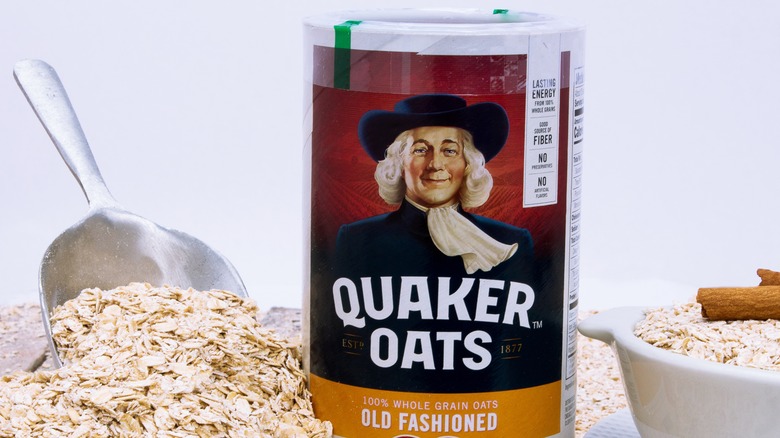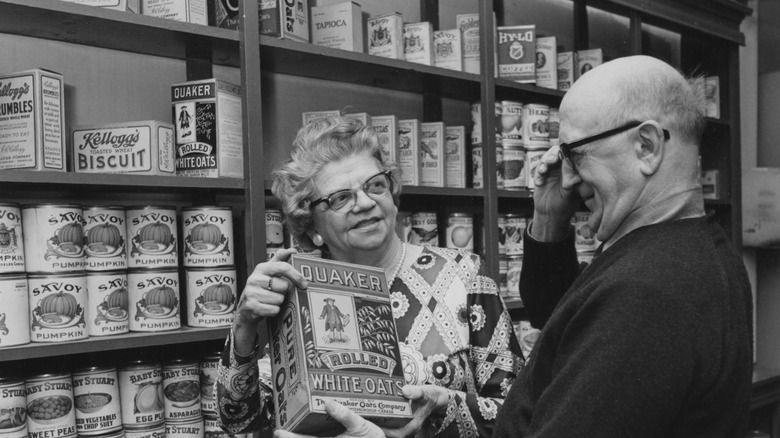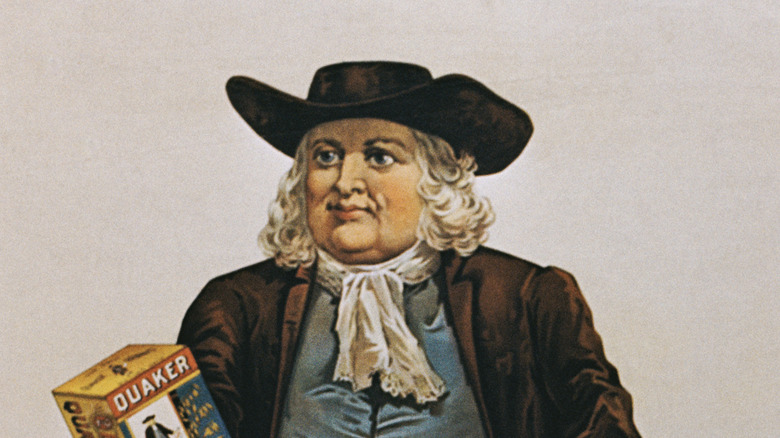Quaker Oats Used To Sell A Lot More Than Just Oatmeal
Company origins are often more confusing than you might expect. We know McDonald's started as a barbecue restaurant, and General Mills created Olive Garden as a brand (no Italians are involved here), while other companies feel more obscure. But all things have a known beginning, especially modern companies. This holds true even for one that seems impossibly old-fashioned — like Quaker Oats.
The history of the Quaker Oats brand isn't just long; it's bizarre, too. If the iconic branding being trademarked in 1877 sounds like an absurdly old origin for a company still operating successfully today, you'd be surprised to know the actual origins of the company go back even further than that to the 1850s. Moreover, the company wasn't simply an oats company; despite its branding around oats, it has sold everything from other breakfast products and sports drinks to children's toys and restaurant chains during its long history.
Quaker Oats expanded its portfolio to include many items
It's wild to think the specific branding of Quaker was so successful that it expanded into other foods while still labeling itself as an oat company, but that's exactly what happened. Oat and wheat cereals were one thing, but the company had rapidly diversified into producing baby food, corn meal, hominy, and animal feed by the time it went with "Quaker Oats" as its official name. From there, other breakfast products – Cap'n Crunch cereal, Aunt Jemima syrup, frozen waffles and pancakes — only made sense. Even Gatorade, acquired in 1983, and Snapple, in 1994, were at least food products.
What was a bit more of a head-scratcher was when it got into brands that had absolutely nothing to do with foods, while still being labeled an oat company. These included toymakers like Fisher Price, chemical companies, and even restaurant chains such as Magic Pan. Eventually, most of these non-food brands were sold off; the company no longer owns Fisher Price, restaurant commitments, or chemical manufacturers (it even sold Snapple in 1997, not long after acquiring it). Quaker itself was eventually purchased by Pepsi in 2001.
The company owes its existence to a power struggle
Ferdinand Schumacher, Robert Stuart, and Henry Parsons Crowell founded the American Cereal Company, which would eventually become Quaker. Though they were the big names in Quaker's rise to prominence, none of them came up with the company's iconic branding. It was Henry Seymour and William Heston who, in 1877, registered the Quaker Oats trademark as "a figure of a man in 'Quaker garb.'" (Contrary to popular belief, the Quaker Oats guy has no connection to William Penn.)
It gets confusing because neither Seymour nor Heston was a part of the company's true rise to prominence. That would instead be Crowell, who purchased the Ravenna, Ohio Quaker Mill and Quaker brand in 1881. When the mascot for that branding finally debuted in 1882, he became the first-ever true breakfast cereal mascot.
It wasn't long before a power struggle ensued, and in the late 1890s, it came to a head. Schumacher, whose company had originally been the largest of the unifying corporations, was initially able to force out Stuart and Crowell, but they returned and gave him the boot. Thanks to Quaker's successful branding under Crowell's leadership, the victors decided to change the name of the American Cereal Company again in 1901, this time for good, to Quaker Oats.


